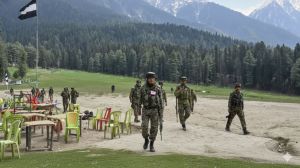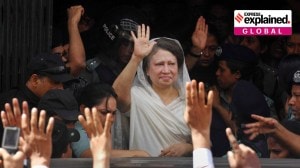Bigger than Bofors
By the time I went to the UK as India's High Commissioner in 1990, the purchase of Westland helicopters was four years old. The British Gov...

By the time I went to the UK as India8217;s High Commissioner in 1990, the purchase of Westland helicopters was four years old. The British Government considered it a hallmark in its relations with India. Whenever there was an exchange of views on any issue between the two countries, Britain8217;s foreign office would bring in the deal to make the point that all unresolved problems could be settled if the attitude which was adopted at the time of purchasing the helicopters was repeated. The exact words used for the deal were: 8220;bright spot8221; in an otherwise sombre atmosphere.
True, certain issues had been simmering between London and New Delhi for too many years. The differences on several international and bilateral issues had surfaced too often resulting in a relationship that was cordial, although not too friendly. Still there was nothing abnormal about the dealings between the two countries. The sale of Westland helicopters was considered a breakthrough. British officials cited it as the best example of understanding. It surprised me how warm and vehement was the British Government in its expression when it came to the helicopters.
British officials had reasons to adopt such a posture because they were able to dupe New Delhi. Westland helicopters had no buyer. The machine8217;s adverse record had travelled fast and wide. But the then Prime Minister Margaret Thatcher was determined to palm them off. India was approached but it said no8217; because the experts in South Block knew all about the helicopters and did not want them in their fleet.
Thatcher did not give up. She wanted to bale out Westland helicopters company, a venture which had devoured millions of pounds without any earnings. She proposed to the then Prime Minister Rajiv Gandhi that she would allocate some 65 million pounds of British aid for India for the purchase of helicopters. Rajiv Gandhi swallowed the bait. So overjoyed was Thatcher that she wrote to him to thank him personally for the purchase which, she said, would not have been possible without him. This was true; it was entirely his decision. And he had rejected all the advice, whether of the Indian Air Force or the ONGC, against the purchase.
Indeed, it was a blatant misuse of foreign aid by Thatcher, the donor, and by Rajiv Gandhi, the beneficiary. I am glad that the deal has been brought into the open by Prime Minister Tony Blair. He is rightly upset over the manner in which Thatcher used the aid to bludgeon others to submission so as to sustain her Iron Lady image. it looks as if he will set up a committee to go into the details of aid, how it has been dispersed among various nations.
Was there any other country like India which was sold a pup? The misuse of humanitarian aid budget for selling British equipment and services is already a major political issue in the UK. Two years ago the country was rocked by aid money misspent on the Pergau Dam in Malaysia.
New Delhi has done well to scrap the deal. But it comes rather late. The helicopters, which did not perform from day one, have been obsolete for some years. From the purchase of 65 million pounds roughly Rs 358 crore, not more than a sum of one million pounds nearly Rs 5 crore is expected to be recovered. Like the Blair Government, the Gujral Government should also hold an inquiry to find out why the helicopters were purchased in the first instance and why the deal was not cancelled earlier. This is yet another scam, far bigger than Bofors in which the kickbacks came to Rs 65 crore. In the case of helicopters it might have been more because Bofors guns at least function properly.
The Overseas Development Administration is the outfit which distributes foreign aid. It is a wing of the British Government. A minister of state heads it. When the helicopter deal was struck, Lynda Chalker was the minister in-charge. She was there when I was the High Commissioner. From the conversation I had with her, it was clear that the aid had strings attached. She wanted India to change its economic policy. She said: 8220;You will have to make real efforts to get long-term aid from the IMF and Western governments8221;. She also said that there were some doubts about the ability of the Indian Government to take hard decisions. In a tone that emulated Thatcher, Chalker said that the Government of India should give positive indication8217; of liberalisation. She added, 8220;You must raise the efficiency of the public sector and reduce budget deficits.8221;
The World Development Movement WDM has taken up the issue. It wants the British Government to add this year another 64 million pounds to the total aid. That the aid should be untied is an argument which is gaining strength. The Labour Government may not agree to it because many avenues for employment will be closed. But the government may be forced to allocate more aid to make up at least part of the 64 million pounds.
Coming back to Westland helicopters, British officials are worried over India8217;s proposal to sell the 21 machines to a spare parts dealer in Sussex. What could it do when the helicopters turned out to be useless? An internal official document of the British Government has itself described the deal as a 8220;catastrophic waste of aid funds.8221; The Department for International Development has said that Westland deal was 8220;a thoroughly bad project with a disappointing outcome8221;. Thatcher has been accused of pushing the deal with uncommon vigour.
Had the Conservative Government been in power, it would have put a lid over the whole transaction. The Labour Government seems determined to bring out everything before the public because it exposes the dark side of Thatcherism. The Gujral Government may, however, feel diffident to rip the cover off the deal because of the Congress support. Rajiv Gandhi cannot be implicated beyond a point because his loyalists in the party would not accept it.
Significantly, the bureaucracy in both the countries is worried because the accusing finger is directed towards it for not jotting down even an objection to the deal. Now Indian and British officials are said to be jointly trying their best to push the wrongs of the deal under the carpet. It will be quite a carpet which can hide a scandal of such magnitude.
- 01
- 02
- 03
- 04
- 05































